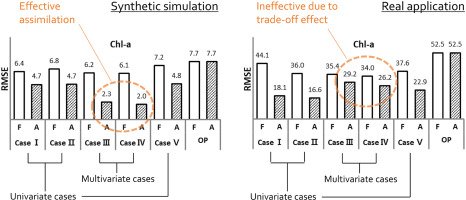当前位置:
X-MOL 学术
›
Water Res.
›
论文详情
Our official English website, www.x-mol.net, welcomes your
feedback! (Note: you will need to create a separate account there.)
Variable update strategy to improve water quality forecast accuracy in multivariate data assimilation using the ensemble Kalman filter.
Water Research ( IF 11.4 ) Pub Date : 2020-03-20 , DOI: 10.1016/j.watres.2020.115711 Sanghyun Park 1 , Kyunghyun Kim 1 , Changmin Shin 1 , Joong-Hyuk Min 1 , Eun Hye Na 1 , Lan Joo Park 1
Water Research ( IF 11.4 ) Pub Date : 2020-03-20 , DOI: 10.1016/j.watres.2020.115711 Sanghyun Park 1 , Kyunghyun Kim 1 , Changmin Shin 1 , Joong-Hyuk Min 1 , Eun Hye Na 1 , Lan Joo Park 1
Affiliation

|
Data assimilation in complex water quality modeling is inevitably multivariate because several water quality variables interact and correlate. In ensemble Kalman filter applications, determining which variables to include and the structure of the relationships among these variables is important to achieve accurate forecast results. In this study, various analysis methods with different combinations of variables and interaction structures were evaluated under two different simulation conditions: synthetic and real. In the former, a synthetic experimental setting was formulated to ensure that issues, including incorrect model error assumption problem, spurious correlation between variables, and observational data inconsistency, would not distort the analysis results. The latter did not have such considerations. Therefore, this process could demonstrate the undistorted effects of the different analysis methods on the assimilated outputs and how these effects might diminish in real applications. Under synthetic conditions, updating a single active variable was found to improve the accuracy of the other active variables, and updating multiple active variables in a multivariate manner mutually enhanced the accuracy of the variables if proper ensemble covariance and observation data consistency were ensured. The results of the real case indicated a weakened mutual enhancement effect, and the methods in which variable localization were applied yielded the best analysis results. However, the multivariate analysis methods produced more accurate forecasting results, indicating that these methods could be superior. Therefore, it is suggested that multivariate analysis methods be considered first for water quality modeling, and the application of variable localization should be considered if significant spurious correlations and data inconsistency are present.
中文翻译:

使用集成卡尔曼滤波器的变量更新策略可提高多元数据同化中水质预测的准确性。
复杂水质模型中的数据同化不可避免地是多元的,因为几个水质变量相互影响并相互关联。在集成卡尔曼滤波器应用中,确定要包括哪些变量以及这些变量之间的关系的结构对于获得准确的预测结果很重要。在这项研究中,在两种不同的模拟条件下(合成和真实)评估了具有不同变量和交互结构组合的各种分析方法。在前者中,制定了一个综合实验设置以确保包括错误的模型误差假设问题,变量之间的虚假相关性以及观测数据不一致在内的问题不会扭曲分析结果。后者没有这样的考虑。因此,这个过程可以证明不同分析方法对同化输出的不失真影响,以及在实际应用中这些影响如何减小。在综合条件下,如果确保适当的整体协方差和观测数据一致性,则发现更新单个活动变量可以提高其他活动变量的准确性,以多变量方式更新多个活动变量可以相互提高变量的准确性。实际案例的结果表明相互增强效果减弱,而应用变量局部化的方法获得了最佳的分析结果。但是,多元分析方法产生的预测结果更准确,表明这些方法可能会更好。因此,
更新日期:2020-03-21
中文翻译:

使用集成卡尔曼滤波器的变量更新策略可提高多元数据同化中水质预测的准确性。
复杂水质模型中的数据同化不可避免地是多元的,因为几个水质变量相互影响并相互关联。在集成卡尔曼滤波器应用中,确定要包括哪些变量以及这些变量之间的关系的结构对于获得准确的预测结果很重要。在这项研究中,在两种不同的模拟条件下(合成和真实)评估了具有不同变量和交互结构组合的各种分析方法。在前者中,制定了一个综合实验设置以确保包括错误的模型误差假设问题,变量之间的虚假相关性以及观测数据不一致在内的问题不会扭曲分析结果。后者没有这样的考虑。因此,这个过程可以证明不同分析方法对同化输出的不失真影响,以及在实际应用中这些影响如何减小。在综合条件下,如果确保适当的整体协方差和观测数据一致性,则发现更新单个活动变量可以提高其他活动变量的准确性,以多变量方式更新多个活动变量可以相互提高变量的准确性。实际案例的结果表明相互增强效果减弱,而应用变量局部化的方法获得了最佳的分析结果。但是,多元分析方法产生的预测结果更准确,表明这些方法可能会更好。因此,











































 京公网安备 11010802027423号
京公网安备 11010802027423号